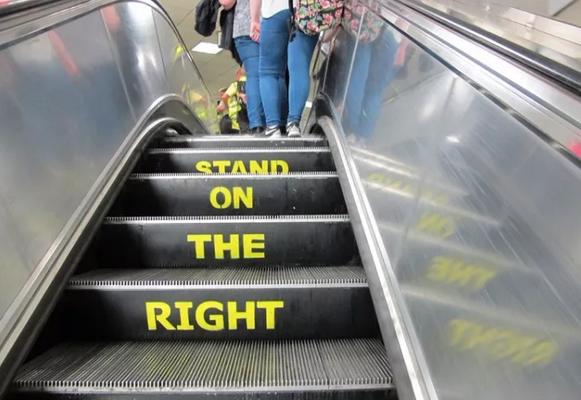当前位置: Language Tips> 专栏作家> 老外在中国
在英国人Craig McIntosh心里,自动扶梯需要分区的概念已经根深蒂固:左行右立——不论是在地铁站、购物中心,还是在机场的自动人行道上。但他却发现,研究证明,自己一直遵守的扶梯礼节不仅不安全,可能还影响了通行效率。

By Craig McIntosh
I first visited London when I was 12 years old, traveling down from my native Northeast England on an overnight bus. The trip was a rite of passage in our family, as my mother had taken my older brother to the Big Smoke when he was the same age.
12岁的时候,我从英格兰东北的家乡出发,坐夜班汽车第一次去了伦敦。这趟旅行是我们家的成人礼。我哥哥也是在12岁时,随母亲去了这个大城市。
Other than the bustling stores along Oxford Road and the chaos of Piccadilly Circus, what left a lasting impression on me were the huge escalators at London Underground stations – not only because of their extraordinary length, but also for the big, yellow warning that was painted on their grinding mechanical steps. KEEP TO THE RIGHT, it read, leaving no room for argument. This was to allow commuters in a hurry (or those who just don’t like standing) to walk up the left-hand side.
伦敦之旅让我印象最深的不是牛津路上的繁忙商店,也不是皮卡迪利广场的热闹景象,而是伦敦地铁站巨大的自动扶梯——不仅长度惊人,而且滚动的机械台阶上还有大大的黄色警示语。上面写着“请靠右”,这毫无讨论的余地。靠右是为了给着急的人(或者那些不想站着的人)让出左边的空间,以供行走。
As men in pinstripe suits zoomed passed, one eye on their broadsheet newspaper, I remember thinking that I couldn’t wait until I was important enough to be in such a rush.
看到穿着细条纹套装的男士从身边快步走过,他们一只眼睛还盯着自己手里的对开报纸,我记得当时心里暗暗着急,简直等不及自己长大,成为可以这样行色匆忙的重要人物。
Although that desire quickly disappeared when I reached my teens, my belief in the division of territory on escalators stuck fast: Stand on the right, walk on the left – be it at a subway station, shopping mall, or those moving sidewalks at airports.
尽管到了青少年时期,这个愿望很快就消失了,自动扶梯需要分区的概念在我心里仍然根深蒂固:左行右立——不论是在地铁站、购物中心,还是在机场的自动人行道上。
On several occasions over the past nine years I’ve even attempted to enforce my “keep right” policy on the Beijing Subway – which, to be fair, has no such rule – with the use of passive-aggressive tutting and the occasional “nihao” to get people blocking the escalator (known as “escalumps” by some, I’m told) to make way. Suffice to say, this has not been the best way to make friends and influence people.
过去九年间,有时候我甚至想在北京地铁上执行我的“靠右”原则——坦白讲,北京没有这样的规定——用消极对抗的啧啧声,偶尔也用“你好”来让堵住自动扶梯的人(有人说,这叫“挡道者”)让出空间。不得不说,这并不是交朋友、感染他人的最好方式。
Yet it turns out it could actually be me who needs re-educating on escalator etiquette after all.
然而,在自动扶梯礼节观念上,可能真正需要改变的是我。
For a start, I’m definitely in the minority. Only 25 percent of people walk on escalators rather than stand, even during rush hours, according to a 2011 study by the University of Greenwich based on data collected in Barcelona, Shanghai and London.
首先,我显然是少数人。2011年格林威治大学基于巴塞罗那、上海和伦敦的数据做了一项研究,发现只有25%的人会在自动扶梯上行走,而不是站着。
Second, it can actually be more efficient if everyone stands. A three-week trial at one of London Underground’s busiest stations in 2015 showed that getting rid of the “walk left” policy allows another 30 people to board an escalator every minute, which helps ease congestion.
其次,如果每个人都站着,实际上效率会更高。2015年,有人在伦敦最繁忙的地铁站进行了一次为期三周的实验。结果发现,放弃“左边行”原则,自动扶梯每分钟能够多运输30个人,这有利于减缓拥堵。
Rail and subway operators in Hong Kong and Japan have also run campaigns in recent years to stop commuters from walking up and down escalators due to an increase in injuries.
近几年,由于受伤人数有所上升,香港和日本的火车和地铁运营商也发起活动,呼吁行人不要在自动扶梯上上下走动。
In the United States alone, escalator accidents kill about 30 people a year and injure about 17,000, according to a 2013 report by the Center for Construction Research and Training. Workers involved in fitting or repairing escalators account for half, while most other casualties are caused by falling. Transportation safety experts say such accidents would happen far less if people just stood still.
根据建筑研究和培训中心2013年的报告,在美国,每年有30人死于自动扶梯事故,约17000人受伤。参与调试和修理自动扶梯的工人占了其中的一半,其伤亡者大部分是因为摔倒造成的。交通安全专家说,如果人们站立不动,这样的事故将会少得多。
After knowing all that, maybe I’ll just use the stairs instead.
了解了这些,我可能得去爬楼梯了。
英文来源:“CHINA DAILY”微信公众号
翻译:程馨莹(实习)
编审:丹妮 董静
音频编辑:唐晓敏
更多内容请关注“CHINA DAILY”微信公众号:

Broadcaster & writer

Craig McIntosh is a news editor at China Daily. Originally from the northeast of England, he moved to Beijing in late 2008. He previously worked at regional and national publications in the UK and the US.
Contact the writer at craig@chinadaily.com.cn
上一篇 : 老外在中国:来感受中国音乐的力量!
下一篇 :
关注和订阅

电话:8610-84883645
传真:8610-84883500
Email: languagetips@chinadaily.com.cn